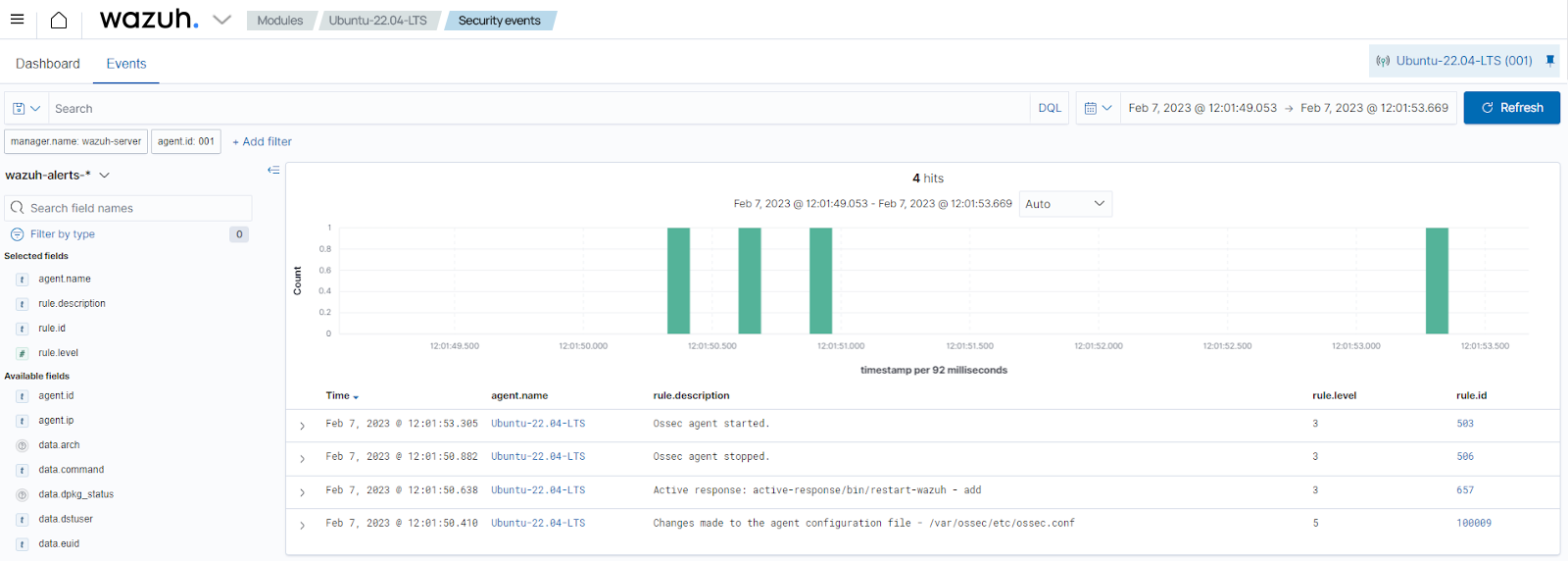Restarting the Wazuh agent with active response
You can use the restart-wazuh active response script to restart the Wazuh agent on a monitored endpoint. In this use case, we configure it to restart the Wazuh agent whenever the /var/ossec/etc/ossec.conf configuration file changes.
Infrastructure
Endpoint |
Description |
|---|---|
Ubuntu 22.04 |
We save changes to the Wazuh agent configuration file on this endpoint to trigger an active response. |
Wazuh server
Open the Wazuh server
/var/ossec/etc/ossec.conffile and verify that a<command>block calledrestart-wazuhwith the following configuration is present within the<ossec_config>block:<command> <name>restart-wazuh</name> <executable>restart-wazuh</executable> </command>
The
<command>block contains information about the action to be executed on the Wazuh agent:<name>: Sets a name for the command. In this case,restart-wazuh.<executable>: Specifies the active response script or executable that must run after a trigger. In this case, it’s therestart-wazuhexecutable.<timeout_allowed>: Allows a timeout after a period of time. This tag is set to no here, which represents a stateless active response.
Add the
<active-response>block below to the Wazuh server/var/ossec/etc/ossec.confconfiguration file:<ossec_config> <active-response> <command>restart-wazuh</command> <location>local</location> <rules_id>100009</rules_id> </active-response> </ossec_config>
<command>: Specifies the command to configure. This is the command namerestart-wazuhdefined in the previous step.<location>: Specifies where the command executes. Using thelocalvalue here means that the command executes on the monitored endpoint where the trigger event occurs.<rules_id>: The active response module executes the command if rule ID100009fires.
Add the rules below to the Wazuh server
/var/ossec/etc/rules/local_rules.xmlconfiguration file:<group name="restart,"> <rule id="100009" level="5"> <if_sid>550</if_sid> <match>ossec.conf</match> <description>Changes made to the agent configuration file - $(file)</description> </rule> </group>
This rule detects changes in the Wazuh agent configuration file.
Restart the Wazuh manager service to apply changes:
$ sudo systemctl restart wazuh-manager
Ubuntu endpoint
Edit the
/var/ossec/etc/ossec.conffile and add the following configuration to the<syscheck>section:<directories realtime="yes">/var/ossec/etc/ossec.conf</directories>
This monitors the Wazuh agent configuration file for any changes.
Restart the Wazuh agent service to apply changes:
$ sudo systemctl restart wazuh-agent
Test the configuration
Add the following block in the
<syscheck>block of the Wazuh agent/var/ossec/etc/ossec.confconfiguration file and save it:<directories realtime="yes">/root</directories>
This addition allows monitoring file changes in the
/rootdirectory of the monitored endpoint. You don’t need to actually add or modify files. It’s just to test the configuration.Warning
Incorrect modifications to the Wazuh agent configuration file might cause the service to crash. It’s important to thoroughly review any changes before implementing them in a production environment.
Visualize the alerts
You can visualize the alert data on the Wazuh dashboard.
